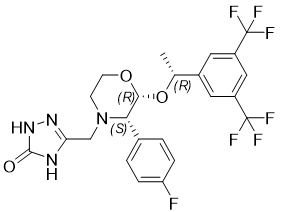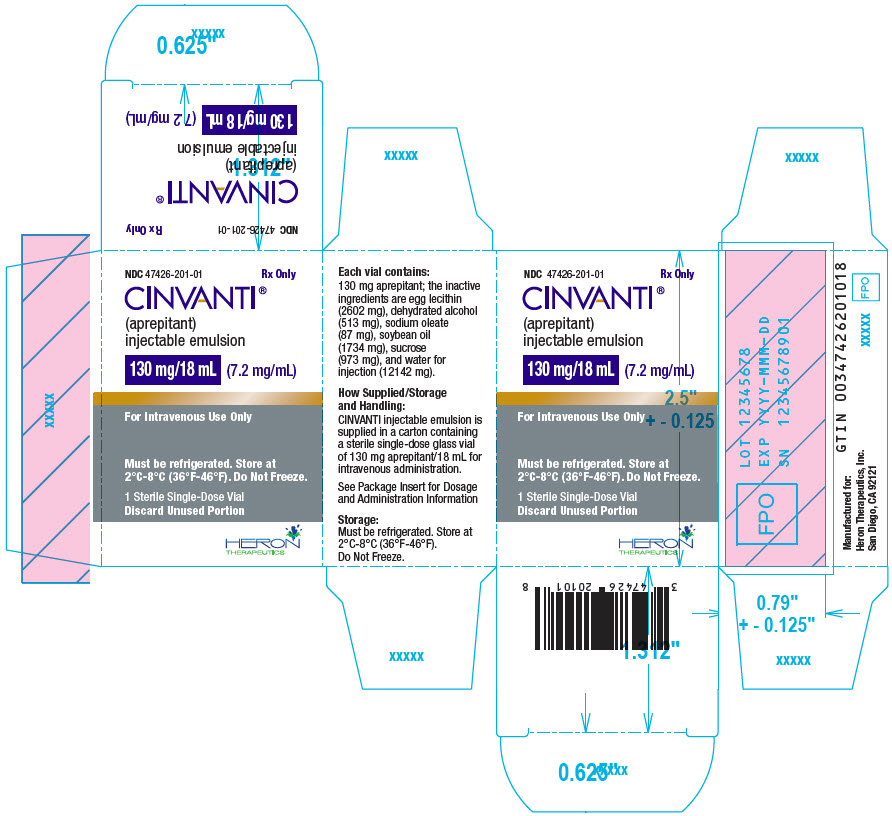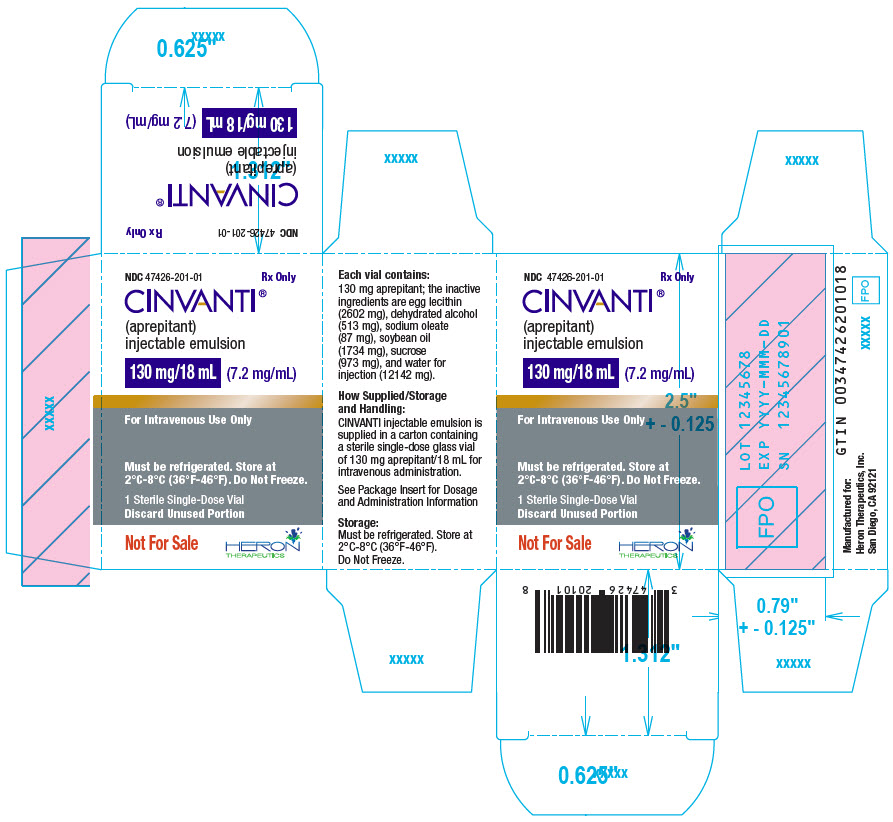Cinvanti
Generic name: Aprepitant Injection
Drug class: NK1 receptor antagonists
Medically reviewed by A Ras MD.
What is Cinvanti?
Cinvanti is a prescription medicine that is used to prevent upset stomach and throwing up.
Description
CINVANTI injectable emulsion contains the active ingredient, aprepitant. Aprepitant is a substance P/neurokinin 1 (NK1) receptor antagonist, an antiemetic agent, chemically described as 5-[[(2R,3S)-2-[(1R)-1-[3,5-bis(trifluoromethyl)phenyl]ethoxy]-3-(4-fluorophenyl)-4-morpholinyl]methyl]-1,2-dihydro-3H-1,2,4-triazol-3-one.
Its empirical formula is C23H21F7N4O3, and its structural formula is:

Aprepitant is a white to off-white crystalline solid, with a molecular weight of 534.43. It is practically insoluble in water. Aprepitant is sparingly soluble in ethanol and isopropyl acetate and slightly soluble in acetonitrile.
CINVANTI (aprepitant) injectable emulsion is a sterile, opaque, off-white to amber liquid in a single-dose vial for intravenous use. Each vial contains 130 mg aprepitant in 18 mL of emulsion. The emulsion also contains the following inactive ingredients: egg lecithin (2.61 g), dehydrated alcohol (0.52 g), sodium oleate (0.09 g), soybean oil (1.74 g), sucrose (0.97 g), and water for injection (12.18 g).
Mechanism of Action
Aprepitant is a selective high-affinity antagonist of human substance P/neurokinin 1 (NK1) receptors. Aprepitant has little or no affinity for serotonin (5-HT3), dopamine, and corticosteroid receptors. Aprepitant has been shown in animal models to inhibit emesis induced by cytotoxic chemotherapeutic agents, such as cisplatin, via central actions. Animal and human Positron Emission Tomography (PET) studies with aprepitant have shown that it crosses the blood brain barrier and occupies brain NK1 receptors. Animal and human studies show that aprepitant augments the antiemetic activity of the 5-HT3-receptor antagonist ondansetron and the corticosteroid dexamethasone and inhibits both the acute and delayed phases of cisplatin-induced emesis.
Before taking Cinvanti, tell your doctor:
- If you are allergic to Cinvanti; any part of this medicine; or any other drugs, foods, or substances. Tell your doctor about the allergy and what signs you had.
- If you take any drugs (prescription or OTC, natural products, vitamins) that must not be taken with Cinvanti, like certain drugs that are used for HIV, infections, or seizures. There are many drugs that must not be taken with Cinvanti.
- If you are pregnant or may be pregnant. Do not take Cinvanti if you are pregnant.
This is not a list of all drugs or health problems that interact with this medicine.
Tell your doctor and pharmacist about all of your drugs (prescription or OTC, natural products, vitamins) and health problems. You must check to make sure that it is safe for you to take Cinvanti with all of your drugs and health problems. Do not start, stop, or change the dose of any drug without checking with your doctor.
What are some things I need to know or do while I take Cinvanti?
- Tell all of your health care providers that you take Cinvanti. This includes your doctors, nurses, pharmacists, and dentists.
- Birth control pills and other hormone-based birth control may not work as well to prevent pregnancy. Use some other kind of birth control also, like a condom, when taking Cinvanti and for 1 month after the last dose.
- Allergic reactions have happened during or soon after infusion of Cinvanti. You will be watched closely while getting Cinvanti and for some time after your dose. Tell your doctor or other health care provider right away if you have dizziness or passing out, fast or abnormal heartbeat, flushing or redness of the face or skin, itching, shortness of breath, swelling of the eyes, trouble swallowing, or wheezing.
- This medicine may cause harm to the unborn baby if you take it while you are pregnant. If you are pregnant or you get pregnant while taking Cinvanti, call your doctor right away.
- Tell your doctor if you are breast-feeding. You will need to talk about any risks to your baby.
How is Cinvanti best taken?
Use Cinvanti as ordered by your doctor. Read all information given to you. Follow all instructions closely.
- It is given as an infusion into a vein over a period of time.
What do I do if I miss a dose?
- Call your doctor to find out what to do.
What are the side effects of Cinvanti that I need to call my doctor about immediately?
WARNING/CAUTION: Even though it may be rare, some people may have very bad and sometimes deadly side effects when taking a drug. Tell your doctor or get medical help right away if you have any of the following signs or symptoms that may be related to a very bad side effect:
- Signs of an allergic reaction, like rash; hives; itching; red, swollen, blistered, or peeling skin with or without fever; wheezing; tightness in the chest or throat; trouble breathing, swallowing, or talking; unusual hoarseness; or swelling of the mouth, face, lips, tongue, or throat.
- Signs of dehydration like dry skin, mouth, or eyes; thirst; fast heartbeat; dizziness; fast breathing; or confusion.
- Signs of infection like fever, chills, very bad sore throat, ear or sinus pain, cough, more sputum or change in color of sputum, pain with passing urine, mouth sores, or wound that will not heal.
- Irritation where Cinvanti is given.
What are some other side effects of Cinvanti?
All drugs may cause side effects. However, many people have no side effects or only have minor side effects. Call your doctor or get medical help if any of these side effects or any other side effects bother you or do not go away:
- Feeling dizzy, tired, or weak.
- Diarrhea or constipation.
- Not hungry.
- Stomach pain or heartburn.
- Hiccups.
- Headache.
- Burping.
These are not all of the side effects that may occur. If you have questions about side effects, call your doctor. Call your doctor for medical advice about side effects.
You may report side effects to the FDA at 1-800-332-1088. You may also report side effects at https://www.fda.gov/medwatch.
If overdose is suspected:
If you think there has been an overdose, call your poison control center or get medical care right away. Be ready to tell or show what was taken, how much, and when it happened.
How do I store and/or throw out Cinvanti?
- If you need to store Cinvanti at home, talk with your doctor, nurse, or pharmacist about how to store it.
Label
PRINCIPAL DISPLAY PANEL – 130 MG/18 ML VIAL CARTON
- NDC 47426-201-01
Rx Only - CINVANTI ®
(aprepitant)
injectable emulsion - 130 mg/18 mL
(7.2 mg/mL) - For Intravenous Use Only
- Must be refrigerated. Store at
2°C-8°C (36°F-46°F). Do Not Freeze. - 1 Sterile Single-Dose Vial
Discard Unused Portion - HERON
THERAPEUTICS

PRINCIPAL DISPLAY PANEL – 130 MG/18 ML VIAL CARTON – NOT FOR SALE
- NDC 47426-201-01
Rx Only - CINVANTI ®
(aprepitant)
injectable emulsion - 130 mg/18 mL
(7.2 mg/mL) - For Intravenous Use Only
- Must be refrigerated. Store at
2°C-8°C (36°F-46°F). Do Not Freeze. - 1 Sterile Single-Dose Vial
Discard Unused Portion - Not For Sale
- HERON
THERAPEUTICS

SRC: NLM .
